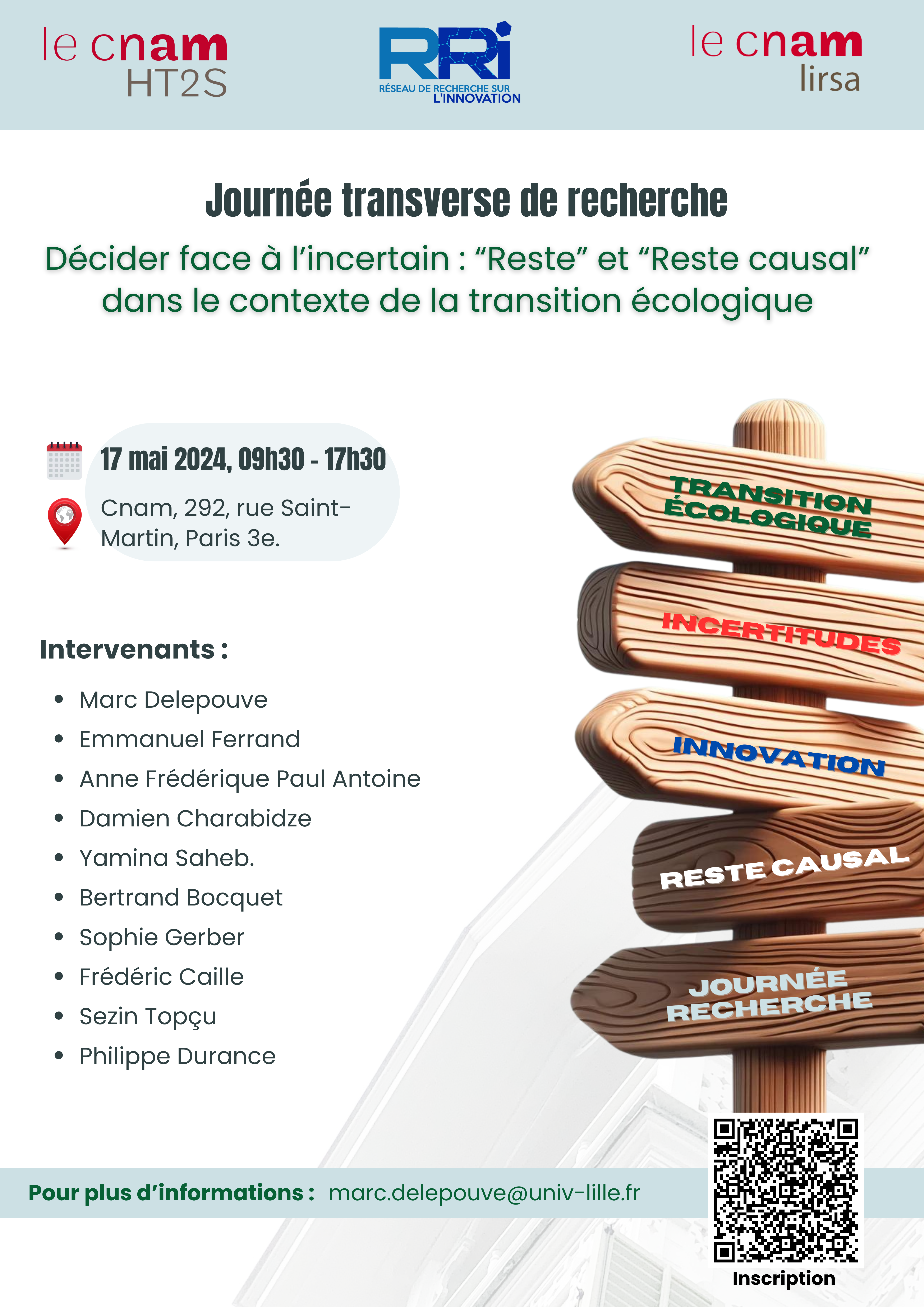Decision-Making in the Face of Uncertainty: "Remainder" and "Causal Remainder"
in the Context of the Ecological Transition
June 17, 2024, 9:30 AM – 5:30 PM (Reception at 9 AM)
Location: Cnam, 292 rue Saint-Martin, Paris 3rd arrondissement
HT2S/LIRSA, Cnam and supported by the RRI
Political and economic decisions regarding the ecological transition are made in a context of radical uncertainties where the effectiveness of the Science/Expertise/Policy triptych relies on the ability to account for the unpredictable. Prospective studies, post-normal science, and the precautionary principle provide some answers to this requirement that need to be further explored: for example, political action by the COP (Conference of the Parties) on climate largely relies on the scenarios of IPCC Working Group 1, although these scenarios leave out a substantial part of the unpredictable.
This cross-disciplinary research day focuses on two new concepts, the “Remainder” and the “Causal Remainder.” Most often, models, theories, scenarios, or quantifications cannot claim to cover all aspects of the real phenomena they aim to approach. This observation takes on particular importance in the current context of radical uncertainties. The introduction of the concept of Remainder associated with a model, theory, scenario, or quantification allows gathering the aspects that are not taken into consideration. The concept of Causal Remainder, on the other hand, is a complement associated with a representation of the past, present, or future evolution of a given phenomenon, which gathers the phenomena influencing or potentially influencing this evolution but are not taken into account in this representation.
The concepts of Remainder and Causal Remainder emerged from a study[1] of climate projections extending to the end of the 21st century, based on climate modeling and published by IPCC Working Group 1. These projections have a Causal Remainder that includes phenomena with a high level of unpredictability that could significantly amplify climate warming during the 21st century. Therefore, these projections, if not accompanied by the presentation of their Causal Remainder, provide a sanitized representation of climate change, a representation that makes major risks invisible. Yet, these projections are used as references for defining climate policies.
The mobilization of the concepts of Remainder and Causal Remainder throughout the triptych Science/Expertise/Policy aims, notably, to improve the consideration of the unpredictable in public policy and innovation decisions. The objective of the cross-disciplinary research day is to enrich the theoretical understanding of these two concepts and to explore their scope beyond the issue of climate change alone, in various fields, often interdisciplinary. To fully demonstrate their potential scope, Remainder and Causal Remainder will be utilized in different fields: mathematical modeling, risk studies, health, innovation, biological research, IPCC scenarios, secondary education curricula, etc. Finally, the contribution of participatory research to knowledge, visibility, and even the reduction of a Remainder or a Causal Remainder will also be addressed.
The day will revolve around oral presentations followed by discussions with the audience. A final roundtable will outline the contours of a network or research community on the issue of quantophrenia[2] and unpredictability through the concepts of Remainder and Causal Remainder. Researchers, doctoral and post-doctoral students, officials, policymakers and private sector actors are among the target audiences for this research day.
[1] These two epistemological concepts stem from the thesis IPCC, a Science and Policy Dialectic, Quantophrenia and the Unpredictable, defended by Marc Delepouve at the National Conservatory of Arts and Crafts (CNAM) in June 2023 and prepared within the HT2S-CNAM laboratory under the supervision of Bertrand Bocquet and co-supervision of Jean-Claude Ruano-Borbalan.
[2] Tendency to limit the representations of phenomena or objects to quantified representations alone, to feed political decision-making processes with these quantified representations alone, and to widely use quantitative criteria as tools for the implementation and evaluation of policies.

